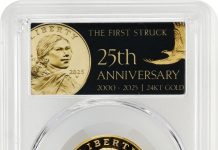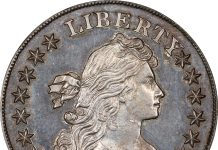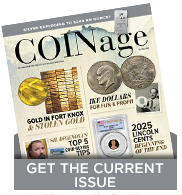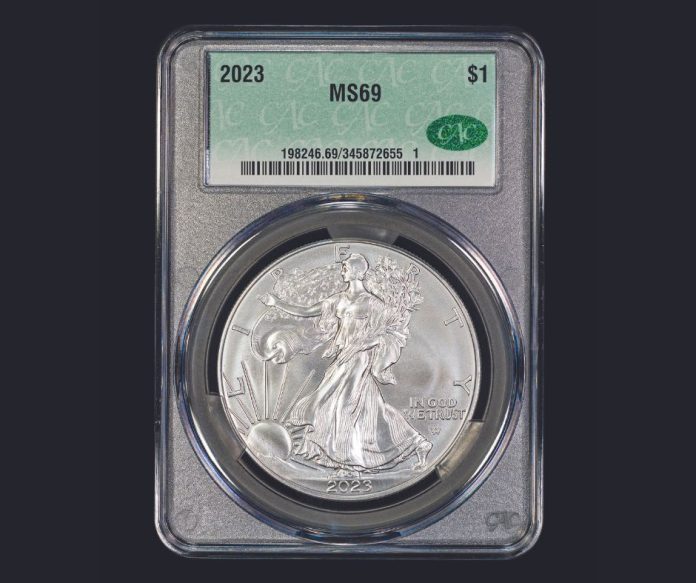
Coin dealers can seem intimidating but with inside knowledge of how coin dealers work you can use this knowledge to your advantage. Here are eight must-know secrets of dealers with insights into how a number of coin dealers operate.
It isn’t easy for someone to be a coin dealer with the existence of two entrenched leading grading services, the Professional Coin Grading Service (PCGS) and the Numismatic Guaranty Company (NGC). Plus now we have a grading verifier Certified Acceptance Corporation (CAC) that has become a full-fledged holdering service (CACG).
This information doesn’t apply to every coin dealer, but it does apply to many. It’s up to you to determine which dealers it applies to and which it doesn’t—and much of that is a matter of using your common sense.
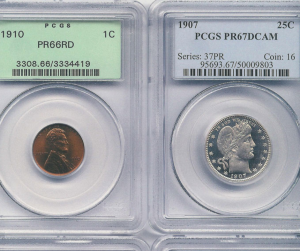 1. Coin Dealers Have an Uneven Knowledge of Coins
1. Coin Dealers Have an Uneven Knowledge of Coins
Many coin dealers are specialists in certain areas, and their in-depth knowledge is limited to the one or two areas in which they specialize. If they deal in silver dollars, and you bring them Buffalo nickels for an appraisal, they’re not going to know the Buffalo nickel series as well. They might have a working knowledge, but not an intimate one. As a result, these dealers sometimes tend to improperly price material in areas outside their specialties. They’re afraid a more knowledgeable buyer may take advantage of them, and sometimes the asking price is too high.
This should make you wary of buying coins from dealers outside of their specialty. At the same time, however, it also can present some exceptional opportunities. If you look closely at all the coins in these dealers’ stock, you frequently can find a scarce variety not certified by a grading service. Invariably, you will find it among the coins outside the dealer’s specialty.
If you find a special coin that the dealer doesn’t recognize as special, you can “rip” it—get it at a price considerably cheaper than what you might have to pay a specialist. In fact, you might be able to turn right around and sell it to a specialist at a profit. This is what’s known in the trade as “cherry-picking” a dealer’s inventory.
A good way to learn about coins, and develop the ability to cherry-pick, is to go to public auctions, where many rare coins of all different kinds are sold in a single place at one time. Make notes before each auction as to which coins you feel are valuable and which you believe are special varieties. Then see what kind of prices these coins bring at the auction, when knowledgeable professionals are bidding on them. If your selections attract unusually spirited bidding and strong prices, you’ve probably picked some real cherries.
2. Dealers Can’t Always Grade Coins Consistently
Many coin dealers are not all that astute at grading coins. They’re excellent businesspersons and fine entrepreneurs; they’re honest, well-meaning, hard-working people. But many smaller dealers just aren’t all that proficient at grading coins.
Don’t take it for granted that a dealer is proficient at grading unless he or she happens to be a market insider—a dealer who is affiliated in some way with one of the leading grading services, for example, or possibly even a dealer who is an owner of a grading service.
Again, this creates tremendous opportunities for you, assuming that you’re willing to take the time and effort to gain and sharpen that edge. You can acquire a good basic knowledge of grading within six months by reading up on the subject, then attending public auctions and examining as many coins as possible. At that point, you might very well be able to spot instances where dealers have graded coins too conservatively. That would enable you to pick up some real bargains. A note of caution: This is sophisticated stuff, and I would recommend that you not risk any sizable sum of money unless and until you’re sure of your ability. And, above all, don’t pretend to be an expert unless you really are.
In general, coins that are in older holders of grading services and have green CAC holographic stickers might qualify to be upgraded. As the perception exists that coins in older holders are graded to a tighter standard, you wouldn’t want to crack a coin out of an older grading service slab and get a downgrade after re-submission.
PCGS offers a “reconsideration” service that allows you to have the coin graded in the old holder (and with the CAC sticker, if applicable). If the coin upgrades, you get it back in a new holder with a higher grade. If it doesn’t upgrade, it gets returned to you in the old holder and with the CAC sticker, if there was one when you submitted it.
The PCGS reconsideration service has made tens of thousands of dollars for astute submitters.
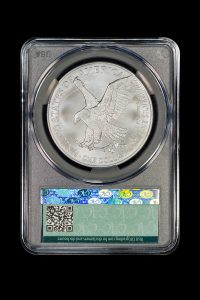 3. Dealers Borrow Money & Can Be Caught Short
3. Dealers Borrow Money & Can Be Caught Short
It isn’t unusual for certain areas of the coin market to fall quickly and without any notice. When it does, dealers are often caught short financially. What we notice is that after the market retreats, dealers are temporarily unable to buy any more coins. But this doesn’t mean that your coins are now worthless, or worth a great deal less than they were before. It’s just an indication of temporary market illiquidity.
Let’s say a coin dealer is willing to pay you $100 for a certain coin on a Friday afternoon—then, on Monday morning, he doesn’t want to buy it at any price, or offers you only $5. This kind of drop is simply too dramatic, and you should flatly refuse to sell the coin. Use your common sense: Hold out until the cash-flow position of that particular dealer—or perhaps of dealers in general—turns around. My experience has been that if you wait a week or so, the cash flow will improve and you’ll be able to sell your coin for a much better price.
4. Coin Dealers are Your #1 Source of Inside Information
One good way to anticipate what may be due to increase in value is to check the price guides and see which coins haven’t gone up in value for a while. Chances are, some of these coins have been at the bottom of their cycle and now may be ready to move up.
An excellent way to confirm your hunch would be to contact a number of different dealers and ask them if they have these coins in stock and whether you can purchase them at the going price. If they don’t have the coins, or won’t let them go at the current market price, you can be pretty sure the supplies are thin—and that would reinforce the likelihood of higher prices soon.
Don’t tip your hand, or start speculation, by e-mailing a hundred dealers and asking for one or two particular coins. A better approach would be to ask about a number of different coins—ten or twenty, perhaps—and somewhere in that list include the one or two coins in which you’re really interested.
Another tipoff would be if you learned that a certain major dealer marketer has been buying specific coins in significant quantities. Let’s say you discover that an internet online dealer with substantial resources has become an aggressive buyer of high-grade Buffalo nickels. You could logically conclude that this dealer is preparing for a big promotional push on Buffalo nickels. That, of course, would stimulate interest—and heightened interest translates into higher prices.
By acting quickly and purchasing high-grade Buffalo nickels yourself before the dealer’s advertising started to appear, you could put yourself in a position to capitalize on the flurry of new activity.
Prices tend to move quickly during a promotional blitz, rising sharply while the push is on and then falling just as sharply once the campaign is over. Thus, you should view this as a short-term situation. Strike while the iron is hot; then take your profits and celebrate.
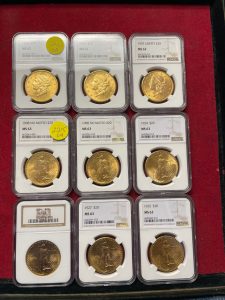 5. Many Dealers Don’t Use Magnifying Glasses
5. Many Dealers Don’t Use Magnifying Glasses
Everyone should use a magnifying glass to examine coins. A 5-power glass to grade is standard but, quite surprisingly, many dealers don’t use a glass all the time. As a result, they sometimes overlook imperfections on certified coins and the ones in grading service holders. This is to your advantage when selling coins to these dealers but may be to your detriment when you buy. I recommend that you use a 5- or 10-power glass when you look at a coin. And be sure that the magnification and lighting conditions are consistent every time.
If possible, coins should be viewed under a pinpoint light source such as a tensor lamp or a halogen lamp.
6. Coin Dealers Are Small Entrepreneurs
A dealer is entitled to a reasonable profit on the coins you buy from him or her; after all, a dealer is in business to make money. However, I don’t recommend that you buy into monthly programs where you give a dealer a set amount of money—say, $1,000 or $2,000—every single month to buy coins for you. In certain months, there just won’t be any great buys available.
Many coin dealers would be happy to take your money each month, in every kind of market, because they have families to support, and they need a steady income. But that wouldn’t always be best from your standpoint.
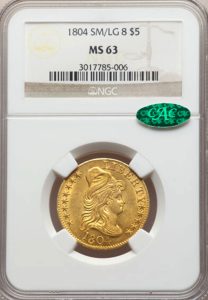
7. Dealers Have a Vested Interest
If you go to some coin dealers at a coin convention with an uncertified coin worth $1,000 and ask “Hey, what’s this worth?” you might be told: “I’ll give you $500.” These dealers would be all too happy to buy such a coin for a lowball $500 offer and then turn around and submit it to a grading service and sell it at a quick profit.
I recommend that you get your coins independently certified and re-submit coins to grading services that might qualify for a higher grade.
Coins in old holders can often be upgraded because the grading standards of some coins were tighter years ago. Instead of sending the coin back to the grading service, I recommend that you send it to CAC for a holographic green sticker that is an assurance that the coin is solid or high-end for the grade.
8. Prepping for Conventions
A number of dealers post “bids” on sight-unseen trading systems to buy coins that they haven’t even seen. They place these bids on computer trading networks that are known as “sight-unseen” systems. If you’re selling coins through a sight-unseen system, always check to see if any major coin conventions are taking place or are imminent.
Coin dealers often withdraw or lower their bids before these major conventions, since they don’t want to be locked in at a high level—with an obligation to buy at that level—if the market suddenly drops at the convention.
The two biggest sponsors of coin conventions are the American Numismatic Association (ANA) and the Florida United Numismatists (FUN). ANA and FUN each hold two major conventions each year. Another important convention-sponsoring organization is the Central States Numismatic Society (CSNS), with one annual convention.
The coin market is a thin marketplace; at any given time, there may be no more than a hundred or so dealers with bids posted on the sight-unseen trading network for certain rare coin types. If all of them withdraw or lower their bids for those coins at the same time—and this does happen— the sight-unseen bids will be lower.
As a rule, dealers attend conventions from Thursday through Saturday. With that in mind, don’t sell your coins on a Friday afternoon if you know there’s a major convention taking place. You might get much better prices by waiting until Monday morning when the dealers return from the show and reinstate their normal sight-unseen bids.
This article about coin dealers previously appeared in COINage magazine. To subscribe click here. Article by Scott A. Travers.


